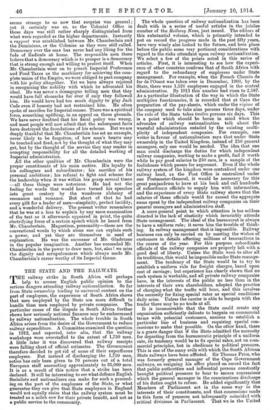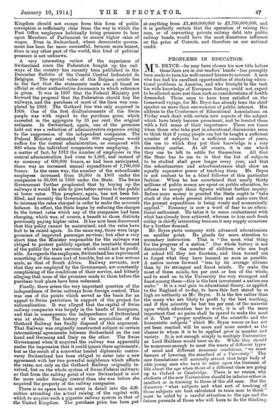THE STATE AND THE RAILWAYS.
THE railway strike in South Africa will perhaps help to arouse English public opinion to the serious dangers attending railway nationalization. So far from State ownership leading to universal content on the part of employees, the experience of South Africa shows that men employed by the State are more difficult to handle than men employed by private companies. The particular cause of the dispute in South Africa further shows how seriously national finances may be embarrassed by railway nationalization. The whole trouble in South Africa arises from the desire of the Government to reduce railway expenditure. A Committee examined the question in 1912, and reported, inter alia, that the railway workshops were overstaffed to the extent of 1,750 men. A little later it was discovered that railway receipts were falling short of official estimates. The Government therefore decided to get rid of some of their superfluous employees. But instead of discharging the 1,750 men, notice has only been given to 70 persona out of a total European staff amounting approximately to 35,000 men. It is as a result of this notice that a strike has been declared. It will be interesting to see what defence English Socialists and nationalizers can make for such a proceed- ing on the part of the employees of the State, or what guarantee they can give that State employees in England would not equally claim that the railway system must be treated as a milch cow for their private benefit, and not as a public service to the community.
The whole question of railway nationalization has been dealt with in a series of useful articles in the jubilee number of the Railway News, just issued. The editors of this substantial volume, which is primarily intended to put on record the progress made in the past fifty years, have very wisely also looked to the future, and here place before the public some very pertinent considerations with regard to the risks attendant upon railway nationalization. We select a few of the points noted in this series of articles. First, it is interesting to see how the experi- ence of other countries confirms that of South Africa with regard to the redundancy of employees under State management. For example, when the French Chemin de fer de l'Ouest was taken over in December, 1908, by the State, there were 1,526 employees engaged in the central administration. By 1911 this number had risen to 2,587. As a particular illustration of the way in which the State multiplies functionaries, it is recorded that at Caen the preparation of the pay-sheets, which under the regime of the company used to take nine persons three days, under the rule of the State takes twelve persons six days. This is a point which should be borne in mind when the advocates of railway nationalization talk about the wasteful administration entailed by the existing multi- plicity of independent companies. For example, one writer in favour of nationalization says that under State ownership in the United Kingdom, instead of 250 general managers, only one would be needed. The idea that one man could discharge the duties for which independent railway companies, working to make a profit, find it worth while to pay good salaries to 250 men, is a sample of the foolishness which passes for argument. Even if the whole railway system of the kingdom were centralized under one railway head, as the Post Office is centralized under one Postmaster-General, it would be necessary for this great panjandrum to have at his beck and call hundreds of subordinate officials to supply him with information, and the experience of every State railway shows that the salaries of these officials would far exceed the aggregate sums spent by the independent railway companies on their general managers and administrative staff. A more general point to which attention is too seldom directed is the lack of elasticity which invariably attends State management. The ideal of the bureaucrat is always to have a uniform rule; it saves him the trouble of think- ing. In railway management that is impossible. Railway business can only be carried on by meeting the wishes of customers in details affecting millions of transactions in the course of the year. For this purpose subordinate officials of the railway companies are properly left with a. good deal of liberty. Unless the State were to alter all its traditions, this would be impossible under State manage- ment. The tendency of the State would be to try to establish a uniform rule for freight charges, based upon cost of carriage; but experience has clearly shown that no such system is workable, and all private railway companies have, in the interests of the public no less than in the interests of their own shareholders, adopted the practice of charging what the traffic will bear, and this involves the necessity for fixing special rates as special conditions daily arise. Unless the carrier is able to bargain with the trader there may be no trade at all.
It is inconceivable that the State could create any organization sufficiently delicate to bargain on commercial terms with potential customers, anxious to establish a particular line of business and requiring special con- cessions to make that possible. On the other hand, there is a grave danger that if the State admitted the necessity for departing from the bureaucratic principle of a uniform rate, its tendency would be to fix special rates, not on com- mercial principles, but in obedience to political pressure. This is one of the many evils with which the South African State railways have been afflicted. Sir Thomas Price, who was formerly general manager of the Cape Government railways, on resigning his office placed on record the fact that public authorities and influential persons constantly brought political pressure to bear to secure concessions which the general manager in the conscientious discharge of his duties ought to refuse. He added significantly that Members of Parliament act in the same way in the interests of their constituents, and that concessions made to this form of pressure not infrequently coincided with critical divisions in Parliament. That we in the United Kingdom should not escape from this form of public corruption is sufficiently clear from the way in which the Post Office employees habitually bring pressure to bear upon Members of Parliament to secure higher rates of wages. Even in Switzerland, where democratic govern- ment has been far more successful, because more honest, than in any other part of the world, this kind of political pressure is not unknown.
A very interesting review of the experience of Switzerland since the Federation bought up the rail- ways of the country has recently been published in the December Bulletin of the Comitti Central Industriel de Belgique. The special value of this Belgian article lies in the fact that the statements made are all based on official or other authoritative documents to which reference is given. It was in 1897 that the Federal Ministry put forward the proposal that the Federation should buy the railways, and the purchase of most of the lines was com- pleted by 1902. The Gothard line was only acquired in 1909. One of the first disillusionments of the Swiss people was with regard to the purchase price, which exceeded in the aggregate by 35 per cent. the original estimate. In Switzerland, again, one of the promises held out was a reduction of administrative expenses owing to the suppression of the independent companies. The Federal Ministry estimated that 600 employees would suffice for the central administration, as compared with 880 whom the individual companies were employing. As a matter of fact, by 1912 the number of employees in the central administration had risen to 1,001, and instead of an economy of 600,000 francs, as had been anticipated, there was an increased annual expenditure of 1,700,000 francs. In the same way, the number of the subordinate employees increased from 26,000 in 1903 under the companies to 36,000 in 1909 under the State. The Swiss Government further prophesied that by buying up the railways it would be able to give better service to the public at lower rates. This prophecy, again, has not been ful- filled, and recently the Government has found it necessary to increase the rates charged in order to make the accounts balance. In effect, the State began by reducing the charges to the lowest rates which any of the companies had been charging, which was, of course, a benefit to those districts previously paying higher rates. It has now been discovered that this policy cannot be maintained, and the rates have bad to be raised again. In the same way, there were large promises of improved passenger services; but after a very short time the Minister responsible for the railways was obliged to protest publicly against the insatiable demand of the public for train services which could not be profit- able. As regards the employees, Switzerland has experienced something of the same sort of trouble, but on a less serious scale, as that of South Africa. Railway servants, now that they are employed by the Government, are constantly complaining of the conditions of their service, and bitterly alleging that none of the promises made to them before the purchase took place have been redeemed.
Finally, there arises the very important question of the independence of Swiss railways from foreign control. This was one of the points which served as the basis for an appeal to Swiss patriotism in support of the project for nationalization. It was alleged that the capital of Swiss railway companies was largely in the hands of foreigners, and that in consequence the independence of Switzerland was at stake. The history of the acquisition of the Gothard Railway has finally disposed of this argument. That Railway was originally constructed subject to certain international agreements between Switzerland on the one hand and Germany and Italy on the other. The Swiss Government when it acquired the railway was apparently under the impression that it could ignore these agreements; but as the result of a somewhat heated diplomatic contro- versy Switzerland has been obliged to enter into a new agreement with her two powerful neighbours which affects the rates, not only on the Gothard Railway originally in- volved, but on the whole system of Swiss Federal railways; so that from the railway point of view Switzerland is now far more under foreign control than she was before she acquired the property of the railway companies.
There is no space here to enter in detail into the diffi- culties attending the actual raising of the capital with which to acquire such a gigantic railway system as that of the United Kingdom. The purchase price has been put at anything from £1,400,000,000 to £1,700,000,000, and it is perfectly certain that the operation of raising this sum, or of converting private railway debt into public railway bonds, would have the most disastrous influence on the price of Consols, and therefore on our national credit.







































 Previous page
Previous page